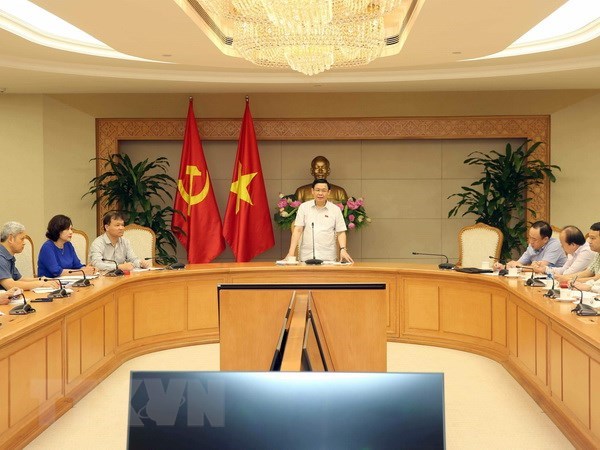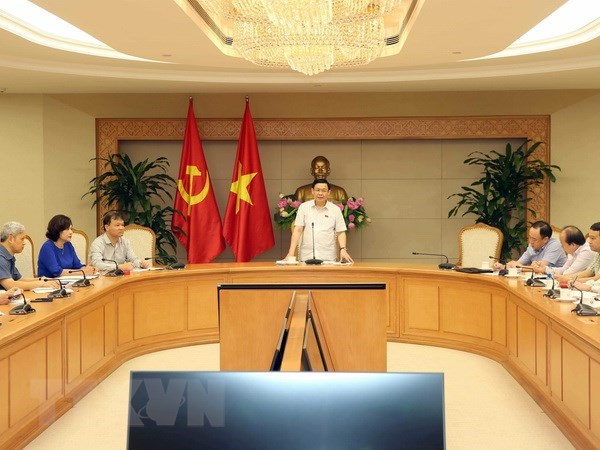
Deputy Prime Minister Vuong Dinh Hue has urged the Government’s Steering Committee for Price Management to seek measures in order to minimize external impacts on domestic prices, thus keeping CPI growth below 4 percent in 2018.
Deputy PM Vuong Dinh Hue speaks at the working session (Source: VNA).
Speaking at a meeting of the committee in Hanoi on May 29,
Deputy PM Hue, who is also head of the committee, said the consumer price index
(CPI) growth in the first four month of this year was in line with the scenario
set by the committee thanks to coordination in price management between
ministries.
However, he said, over the past two months, higher prices of
oil, gas, pork and food, plus complex developments in the world’s market have
put huge pressure on the price management work.
Nguyen Anh Tuan, Director of the Finance Ministry’s Price
Management Department, the CPI expanded by 3.01 percent in the first five
months of 2018.
The ministry forecast that such factors as floods, the
adjustment of prices of health care and education services, along with an
increase in the basic salary and environmental tax on fuels would put more
pressure on the CPI.
However, the pressure would be eased thanks to the stable
demand for fresh food in the summer, a decrease of 10-15 percent in medicine
prices under the centralised bidding programme for drugs, and stable interest
rates, among others.
Deputy Minister of Industry and Trade Do Thang Hai said his
ministry has instructed the Electricity of Vietnam (EVN) Group to save
production costs so as to maintain the current power retail prices, while
closely coordinating with the Ministry of Finance to effectively and
harmoniously use the oil and gas stabilisation fund.
Deputy Minister of Transport Le Dinh Tho said
Build-Operate-Transfer (BOT) toll stations have basically adjusted road fees in
line with the government’s instructions and stabilised prices of seaport and
airport services.
Concluding the working session, Deputy PM Hue stressed that
it is possible to control the CPI growth below 4 percent in 2018.
He asked the ministries to maintain prices of goods managed
by the State and continue with the review work to accelerate the decrease of
prices of such products as drugs and medical materials.
The Ministry of Agriculture and Rural Development and other
relevant ministries were asked to maintain rice export structure, control the
number of pig farms and actively negotiate with China to ship more Vietnamese
fruits to the country.
The Deputy PM also urged the Health Ministry to push the
centralised bidding of drugs and the bidding of medical equipment, while
promptly issuing a circular to replace Circular No. 37. The new circular should
come into force from July 15, 2018, stipulating the decreased of 80 types of
medical services.-
Source: VNA
According to data from the Hoa Binh Provincial Party Committee, the industrial production index for the first six months of 2025 is estimated to have increased by 20% compared to the same period last year. This marks the highest year-on-year growth rate for this period since 2020.
In the first six months of 2025, Hoa Binh province’s export turnover was estimated at 1.145 billion USD, marking an 18.11% increase compared to the same period in 2024. Import turnover was estimated at $ 804 million, a 17.15% increase, which helped the province maintain a positive trade balance.
The lives of the ethnic minority farmers in Tan Lac district have gradually improved thanks to the new directions in agricultural production. This is a testament to the collective strength fostered through the professional associations and groups implemented by various levels of the district’s Farmers’ Union.
With the motto the "product quality comes first,” after nearly one year of establishment and operation, Muong village’s Clean Food Agricultural and Commercial Cooperative, located in Cau Hamlet, Hung Son Commune (Kim Boi district), has launched reputable, high-quality agricultural products to the market that are well-received by consumers. The products such as Muong village’s pork sausage, salt-cured chicken, and salt-cured pork hocks have gradually carved out a place in the market and they are on the path to obtaining the OCOP certification.
In the past, the phrase "bumper harvest, rock-bottom prices" was a familiar refrain for Vietnamese farmers engaged in fragmented, small-scale agriculture. But today, a new spirit is emerging across rural areas of Hoa Binh province - one of collaboration, organisation, and collective economic models that provide a stable foundation for production.
Maintaining growing area codes and packing facility codes in accordance with regulations is a mandatory requirement for agricultural products to be eligible for export. Recently, the Department of Agriculture and Environment of Hoa Binh province has intensified technical supervision of designated farming areas and packing facilities to safeguard the "green passport" that enables its products to access international markets.



